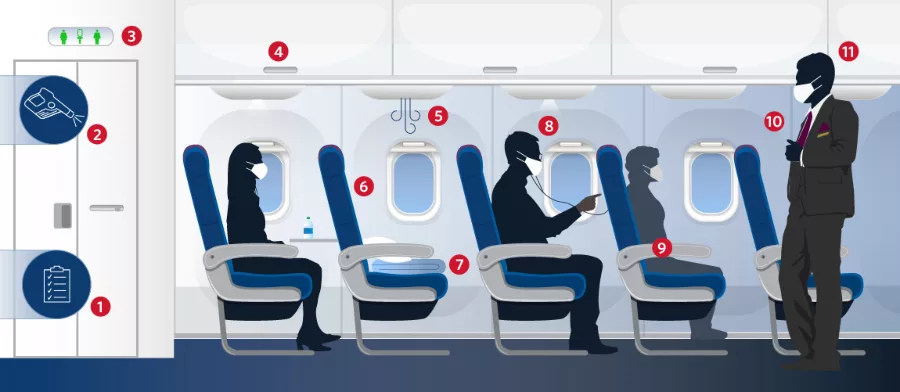Delta Airlines Reduces Cabin Seating

Delta Airlines will be reducing its cabin seating and blocking middle seats to improve safety and cleanliness during the COVID-19 pandemic.
"Reducing the overall number of customers on every aircraft across the fleet is one of the most important steps we can take to ensure a safe experience for our customers and people,” said Chief Customer Experience Officer Bill Lentsch. “Delta is offering the highest standards in safety and cleanliness so we’re ready for customers when they’re ready to fly again.”
According to a news release, latest safety improvements include:
- Extension of seating caps: Through Sept. 30, Delta will ensure more space for customers on all aircraft by capping seating at 50% in First Class; 60% in Main Cabin, Delta Comfort+, and Delta Premium Select; and 75% in Delta One to reduce the total number of customers on board.
- Blocking middle seats: Through Sept. 30, all middle seats will continue to be shown as unavailable or not assignable when selecting seats via the Fly Delta app or online. They'll also continue to block the selection of some aisle seats in aircraft with 2x2 seating configurations.
- Restarting automatic Medallion upgrades: Starting June 10, Delta will resume automatic, advance Medallion Complimentary Upgrades to Delta One (domestic U.S.), First Class and Delta Comfort+ – which were previously being managed at the gate – subject to availability and as permitted by the seat caps.
- Adding flying where we are full: On routes where increasing customer demand is driving flight loads closer to their caps, Delta will look for opportunities to upsize to a larger aircraft type or add more flying.
Other measures Delta has employed include:
- Requiring customers and employees to wear face coverings throughout the travel journey to ensure an extra layer of protection.
- Installing plexiglass shields at all Delta check-in counters, in Delta Sky Clubs and at gate counters across the globe.
- Adding social distance markers in check-in lobbies, Delta Sky Club check-in areas, at the gate and down the jetbridge to encourage customers to stand apart. Employees and messaging throughout the airport are reminding customers to keep space, too.
- Wiping down check-in lobbies, self-service kiosks, gate counters and baggage claims many times throughout the day. And by summer, Delta teams will be using electrostatic spraying in all airports Delta serves in the U.S. – the same measure used on every Delta flight prior to boarding. They have also started electrostatic spraying at TSA checkpoints in key markets and are working with the TSA to provide electrostatic spraying at all checkpoints in the airports Delta serves.
- Using state-of-the-art air circulation systems with industrial-grade HEPA filters on many Delta aircraft that extract more than 99.99% of particles, including viruses.
- Boarding all flights from back to front, reducing the instances of customers passing by one another to reach their seats.
- Streamlining onboard food and beverage service on all flights and encouraging customers to pack their own food and non-alcoholic beverages to decrease physical touch points.
- Providing supplies directly to customers when available, including hand sanitizers, care kits and other protective equipment to minimize the spread of COVID-19.
- Continuing to work with health experts, partners and healthcare industry leaders on best practices.
Looking for a reprint of this article?
From high-res PDFs to custom plaques, order your copy today!



